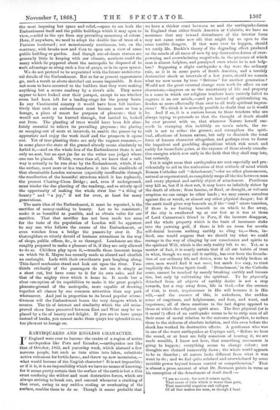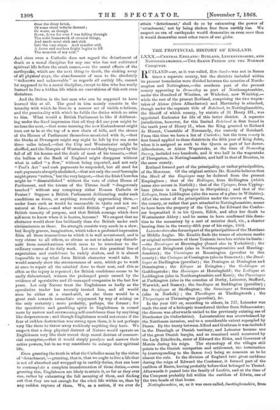EARTHQUAKES AND ENGLISH CHARACTER.
IF England were ever to become the centre of a region of active earthquakes like Peru and Ecuador,—earthquakes not like that of October, 1863, and yesterday week, which alarmed a few nervous people, but such as turn cities into lakes, substitute active volcanoes for fertile farms, and throw up new mountains,— what would become of the English character? It is not impossible ; -or if it is, it is an impossibility which we have no means of knowing, for it seems pretty certain that the surface of the earth is but a thin -crust confining the wildest and most destructive forces, which are always striving to break out, and succeed whenever a cracking of that crust, owing to any sudden cooling or overheating of the surface, enables them to do so. Though it seems probable that
we have a thicker crust between us and the earthquake-forces in England than either South America or Calabria, we have no assurance that any inward disturbance of the interior force may not cause some new rift that might lay us open to the same terrible dangers. If that were ever to happen, should we verify Mr. Buckle's theory of the degrading effect produced
on the minds of all races of men by any destructive forces of over- powering and overwhelming magnitude, in the presence of which man is almost helpless, and paralyzed even where he is not help-
less? Supposing a slight earthquake a day were the ordinary rule, as it is in some parts of South America, and a terribly destructive shock at intervals of a few years, shauld we remain what we now mean by true " Britons " for another generation ?
Would not the great external change soon work it-s effect on our characters,—impress on us the uncertainty of life and property in a sense in which our religious teachers have entirely failed to engrave it on our minds,—and yet instead of spiritualiziug us, deaden us more effectually than ever to all truly spiritual impres- sions? We think it is scarcely possible to doubt that so it would be. And if so, it is a curious lesson to those teachers who are always trying to persuade us that the thought of death should be ever present with us, that wherever Nature herself suc-
ceeds in stamping this indelibly on men's minds, the re- sult is not to refine the grosser, and strengthen the spiri-
tual, affections of human nature, but only to diminish the total force of human character altogether, and perhaps even to foster the impatient and gambling dispositions which risk much and rashly for immediate gains, at the expense of those slowly cumula- tive energies which sow early in the faith that they shall reap late, but certainly.
Yet it might seem that earthquakes are sent especially and pro- videntially to aid in the realization of that attitude of mind which Roman Catholics call "detachment,"—for no other phenomenon,
natural or supernatural, so completely snaps all the ties between man and every physical and earthly object of attachment. Pestilence may kill us, but if it does not, it may leave us infinitely richer by the death of others; from famine, or flood, or drought, or volcanic eruption we can escape to other lands ; we may ensure ourselves against fire or wreck, or almost any other physical danger ; but if
the earth itself gives way beneath us, if the " real " estate vanishes, if there is no footing beneath us on which to flee away, if the city is swallowed up at our feet as it was at those of Lord Carnarvon's friend in Peru, if the insurers disappear, and the whole property which is the basis of insurance sinks into the yawning gulf, if there is left no room for ascetic self-denial because nothing earthly to cling to,— then, in- deed, one would suppose that we should try what we could manage in the way of clinging by our consciences and spirits to the spiritual Will, which is the only reality left to us. Yet, as a matter of fact, it is nearly certain that if all our habits of trust in what, though we may call it earthly, has ever been the founda-
tion of our ordinary life and duties, were to be rudely broken at once, men would find it not more, but much less easy, to trust implicitly the Divine Spirit itself. 'Detachment,' in the Catholic sense, cannot be reached by merely breaking earthly and human ties, but only by cultivating the spiritual. To be physically detached from all objects of earthly desire is not a step towards, but a step away from, life in God,—for the essence
of that, is trust, acquiescence in His will because it is His will,—and the essence of this, is nakedness, the sudden sense of emptiness, and helplessness, and fear, and want, and impotence, all of them emotions in the last degree opposed to those at which the religious spirit aims. The first physical (or is it moral ?) effect of an earthquake seems to be to strip men of all their sense of moral relation to the universe altogether, to reduce them to the sickness of absolute isolation, and this even before the shock has worked its destructive effects. A gentleman who was in one of the worst earthquakes at Copiapo said, "Before we hear the sound, or at least are fully conscious of hearing it, we are made sensible, I know not how, that something uncommon is going to happen ; everything seems to change colour ; our
thoughts are chained immovably down ; the whole world appears to be in disorder ; all nature looks different front what it was wont to do ; and we feel quite subdued and overwhelmed by some invisible power beyond human control or comprehension." That is almost a prose account of what Dr. Newman paints in verse as, his conception of the detachment of death itself :— " I am no more ; for now it comas again, That sense of ruin which is worse than pain, That masterful negation and collapse Of all that makes me man, as though I bent Over the dizzy brink,
Of some sheer infinite descent; Or worse, as though Down, down for over I was falling through The solid framework of created things, And needs must sink and sink Into the vast abyss. And crueller still, A fierce and restless fright begins to fill The mansion of my soul."
And since even a Catholic does not regard the detachment of death as a moral discipline for any one who has not cultivated spiritual life before the crash comes,—so the moral effects of the earthqualte; which are the next thing to death, the sinking away of all physical stays, the abandonment of man to the absolutely " unknottn and unknowable" as regards all earthly life, cannot be supposed to be a moral discipline, except to him who has really learned to live a hidden life which no convulsions of this sort even threatens.
And the Briton is the last man who can be supposed to have learned this at all. The good in him mainly consists in the tenacity with which he lives in a narrow set of visible relations, and the punctuality with which be fulfils the duties which so arise to him. What would a British Parliament be like if deliberat- ing under the fixed impression that all they did one year might be undone the next,—that some morning the new Embankment might turn out to be at the top of a new chain of bills, and the stones of the Houses of Parliament themselves associated with it,—that the Docks at Devonport might any night be left by the sea some three miles inland,—that the City and Westminster might be shuffled, and the Marquis of Westminster suddenly beggared by the fall of all his houses and the death of most of his tenants,—that the bullion at the Bank of England might disappear without what is called "a flow," without being exported, and not only "Peel's Act" and cash payments be suspended, but all need for cash payments abruptly abolished,—that not only the small boroughs might prove "rotten," but the very largest,—that the Irish Churches might be "disestablished" without the vote of either House of Parliament, and the tenure of the Throne itself "dangerously touched" without any conspiracy either Roman Catholic or Fenian ? Suppose a British Parliament deliberating under such conditions as these, or anything remotely approaching them,— under fears such as would be reasonable in Quito and not un- natural at Lima,—and what would British "good sense," and British tenacity of purpose, and that British courage which does nOrneem to know when it is beaten, become? We suspect that no chaiacter would show less brilliantly than the British under such ciramstanees as these. Its strength consists very much in a slow, but'ileeply graven, imagination, which takes a profotind impression fiOna all those transactions to which it is well accustomed, and is very obtuse to all others, so obtuse as not to admit any disturb- aiti. from considerations which seem to be irrevelant to the ordinary course of its daily work. Let once this practical line of expectation and confidence be rudely shaken, and it is almost impossible to say what form British character would take. It would scarcely show the strenuousness of ants, which go to work at once to repair all the mischief done to their nest, and this as often as the injury is repeated ; for British confidence seems to be easily disheartened, witness the prolonged panic caused by the evidence of speculative and ill-managed companies in the last few years. Let only Nature treat the Englishman as badly as the speculative trader has recently treated him, and all would soon be either at a stand-still, or else there would be a great rush towards immediate enjoyment by way of seizing on the only certainty ; more probably, perhaps, the former ; for the speculative and gambling spirit in Englishmen is caused more by narrow and overweening self-confidence than by anything like desperateness ; and though Englishmen would not create if the fear of sudden destruction was strong upon them, it is not perhaps very like them to throw away recklessly anything they have. We suspect that a deep physical distrust of Nature would operate on Englishmen very like their recent deep moral distrust of commer- cial enterprise,—that it would simply paralyze and narrow their active powers, but in no way contribute to enlarge their spiritual Even granting the truth in what the Catholics mean by the virtue of 'detachment,'—granting, that is, that we ought to live a life that is not all absorbed and wrapped up in earthly duties, that can bear to contemplate a complete transformation of those duties,—even granting this, Englishmen are likely to attain it, so far as they ever can, rather by exhausting the full meaning of them, and finding out that they are not enough for the whole life within us, than by any sudden rupture of them. We, as a nation, if we ever do attain 'detachment,' shall do so by exhausting the power of attachment,' not by being shaken free from earthly ties. We suspect an era of earthquake would demoralize us even more than it would demoralize most other races of our globe.































 Previous page
Previous page